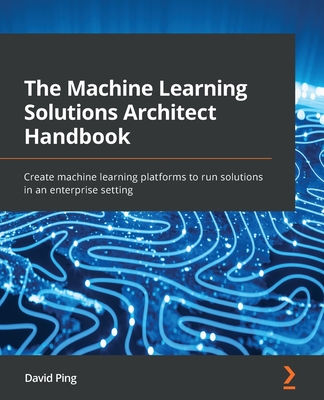The Machine Learning Solutions Architect Handbook: Practical strategies and best practices on the ML lifecycle, system design, MLOps, and generative AI, 2/e (Paperback)
Ping, David
- 出版商: Packt Publishing
- 出版日期: 2024-04-15
- 售價: $1,800
- 貴賓價: 9.5 折 $1,710
- 語言: 英文
- 頁數: 602
- 裝訂: Quality Paper - also called trade paper
- ISBN: 1805122509
- ISBN-13: 9781805122500
-
相關分類:
Machine Learning
立即出貨 (庫存=1)
買這商品的人也買了...
-
 Principles of Communications: Systems, Modulation and Noise, 7/e (Paperback)
Principles of Communications: Systems, Modulation and Noise, 7/e (Paperback)$1,450$1,421 -
 $1,617Deep Learning (Hardcover)
$1,617Deep Learning (Hardcover) -
 空調工程實務寶典
空調工程實務寶典$1,300$1,170 -
 冷凍工程實務寶典
冷凍工程實務寶典$1,300$1,170 -
 Artificial Intelligence: A Modern Approach, 4/e (IE-Paperback)
Artificial Intelligence: A Modern Approach, 4/e (IE-Paperback)$1,460$1,387 -
 Artificial Intelligence and Brain Research: Neural Networks, Deep Learning and the Future of Cognition (Paperback)
Artificial Intelligence and Brain Research: Neural Networks, Deep Learning and the Future of Cognition (Paperback)$1,330$1,264
相關主題
商品描述
Design, build, and secure scalable machine learning (ML) systems to solve real-world business problems with Python and AWS
Key Features
- Go in-depth into the ML lifecycle, from ideation and data management to deployment and scaling
- Apply risk management techniques in the ML lifecycle and design architectural patterns for various ML platforms and solutions
- Understand the generative AI lifecycle, its core technologies, and implementation risks
Book Description
David Ping, Head of GenAI and ML Solution Architecture for global industries at AWS, provides expert insights and practical examples to help you become a proficient ML solutions architect, linking technical architecture to business-related skills.
You'll learn about ML algorithms, cloud infrastructure, system design, MLOps, and how to apply ML to solve real-world business problems. David explains the generative AI project lifecycle and examines Retrieval Augmented Generation (RAG), an effective architecture pattern for generative AI applications. You'll also learn about open-source technologies, such as Kubernetes/Kubeflow, for building a data science environment and ML pipelines before building an enterprise ML architecture using AWS. As well as ML risk management and the different stages of AI/ML adoption, the biggest new addition to the handbook is the deep exploration of generative AI.
By the end of this book, you'll have gained a comprehensive understanding of AI/ML across all key aspects, including business use cases, data science, real-world solution architecture, risk management, and governance. You'll possess the skills to design and construct ML solutions that effectively cater to common use cases and follow established ML architecture patterns, enabling you to excel as a true professional in the field.
What you will learn
- Apply ML methodologies to solve business problems across industries
- Design a practical enterprise ML platform architecture
- Gain an understanding of AI risk management frameworks and techniques
- Build an end-to-end data management architecture using AWS
- Train large-scale ML models and optimize model inference latency
- Create a business application using artificial intelligence services and custom models
- Dive into generative AI with use cases, architecture patterns, and RAG
Who this book is for
This book is for solutions architects working on ML projects, ML engineers transitioning to ML solution architect roles, and MLOps engineers. Additionally, data scientists and analysts who want to enhance their practical knowledge of ML systems engineering, as well as AI/ML product managers and risk officers who want to gain an understanding of ML solutions and AI risk management, will also find this book useful. A basic knowledge of Python, AWS, linear algebra, probability, and cloud infrastructure is required before you get started with this handbook.
商品描述(中文翻譯)
設計、構建和保護可擴展的機器學習(ML)系統,以解決實際的業務問題,使用Python和AWS。
主要特點:
- 深入研究ML生命周期,從構思和數據管理到部署和擴展
- 在ML生命周期中應用風險管理技術,並設計各種ML平台和解決方案的架構模式
- 了解生成式AI生命周期、其核心技術和實施風險
書籍描述:
AWS全球行業的GenAI和ML解決方案架構負責人David Ping提供專家見解和實際示例,幫助您成為熟練的ML解決方案架構師,將技術架構與與業務相關的技能相結合。
您將學習ML算法、雲基礎設施、系統設計、MLOps以及如何應用ML解決實際的業務問題。David解釋了生成式AI項目的生命周期,並研究了檢索增強生成(RAG),這是一種有效的生成式AI應用的架構模式。您還將學習使用Kubernetes/Kubeflow等開源技術構建數據科學環境和ML流水線,然後使用AWS構建企業級ML架構。除了ML風險管理和AI/ML採用的不同階段外,本手冊最重要的新增內容是對生成式AI的深入探索。
通過閱讀本書,您將全面了解AI/ML在所有關鍵方面的知識,包括業務用例、數據科學、實際解決方案架構、風險管理和治理。您將具備設計和構建ML解決方案的能力,以滿足常見的用例並遵循已建立的ML架構模式,使您在該領域成為真正的專業人士。
您將學到什麼:
- 應用ML方法解決各行業的業務問題
- 設計實用的企業級ML平台架構
- 獲得對AI風險管理框架和技術的理解
- 使用AWS構建端到端的數據管理架構
- 訓練大規模的ML模型並優化模型推斷延遲
- 使用人工智能服務和自定義模型創建業務應用
- 深入研究生成式AI,包括用例、架構模式和RAG
本書適合對ML項目工作的解決方案架構師、從ML工程師轉向ML解決方案架構師角色的ML工程師和MLOps工程師。此外,希望增強其ML系統工程實踐知識的數據科學家和分析師,以及希望瞭解ML解決方案和AI風險管理的AI/ML產品經理和風險官員,也會發現本書很有用。在開始閱讀本手冊之前,需要具備Python、AWS、線性代數、概率和雲基礎設施的基本知識。
目錄大綱
- Navigating the ML Lifecycle with ML Solutions Architecture
- Exploring ML Business Use Cases
- Exploring ML Algorithms
- Data Management for ML
- Exploring Open-Source ML Libraries
- Kubernetes Container Orchestration Infrastructure Management
- Open-Source ML Platforms
- Building a Data Science Environment using AWS ML Services
- Designing an Enterprise ML Architecture with AWS ML Services
- Advanced ML Engineering
- Building ML Solutions with AWS AI Services
- AI Risk Management
- Bias, Explainability, Privacy, and Adversarial Attacks
(N.B. Please use the Read Sample option to see further chapters)
目錄大綱(中文翻譯)
導航機器學習生命週期與機器學習解決方案架構
探索機器學習商業應用案例
探索機器學習演算法
機器學習的資料管理
探索開源機器學習函式庫
Kubernetes容器編排基礎架構管理
開源機器學習平台
使用AWS機器學習服務建立資料科學環境
使用AWS機器學習服務設計企業機器學習架構
進階機器學習工程
使用AWS人工智慧服務建立機器學習解決方案
人工智慧風險管理
偏見、可解釋性、隱私和對抗性攻擊











